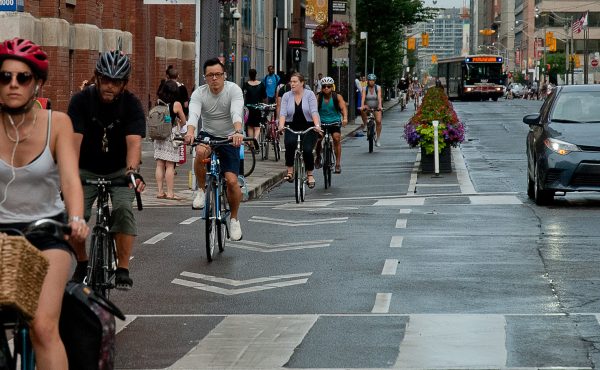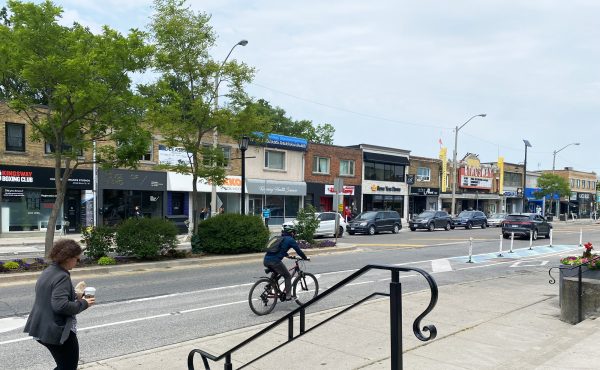Toronto’s bike lanes have always been about more than just cycling – they are about building a city that moves smarter, cleaner, and safer. As someone who currently rides a pedal-assist e-bike, both for work as the Urbanist-in-Residence at the University of Toronto’s School of Cities and as a parent committed to ensuring safe transportation for my children and their peers, I feel compelled to challenge Martin Regg Cohn’s recent piece in the Toronto Star dismissing the value of bike lanes.
First, let’s address the core misconception that bike lanes are an over-investment used by too few. This narrative not only misrepresents who benefits from bike lanes but also misses the broader societal gains they enable. The reality is that safe cycling infrastructure is about choice and access. When people know they can travel safely by bike, they are far more likely to do so. Data from studies by University of Toronto engineering faculty confirms this: for every 100 additional workplaces accessible via safe bike infrastructure, cycling increases by 40%. This isn’t anecdote; it’s evidence that when we build it, people bike.
But cycling isn’t just about commuters like me; it’s about creating a network that benefits families, local businesses, and even drivers. Studies worldwide – and in our own backyard – show that bike lanes boost economic activity. People on bikes frequent local shops more often and spend more per trip than drivers. These lanes are not drains on public funds; they are investments in community vitality, public health, and climate action.
Cohn’s argument also glosses over the immense value bike lanes provide to the gig workers he dismissively labels as “e-bikers with pretend pedals.” These workers, often recent immigrants, rely on safe cycling infrastructure to make a living. The issue isn’t the existence of bike lanes; it’s the exploitative nature of gig economy work. Let’s be clear: tearing up bike lanes won’t solve precarious employment, but it will make the lives of these essential workers even harder and more dangerous.
The article’s fixation on underused bike lanes during winter also misses the point. Infrastructure isn’t judged by seasonal peaks but by the long-term benefits it delivers. Highways aren’t dismantled because traffic decreases at night, and sidewalks aren’t removed because they’re less crowded in January. Toronto’s bike network is a vital artery that keeps people moving year-round, and its maintenance reflects the city’s commitment to equitable mobility.
Let’s also dispel the notion that bike lanes exacerbate gridlock. The “war on the car” rhetoric ignores the fact that cities around the world have proven that reallocating road space to bikes reduces overall congestion. A leaked provincial report even acknowledged that bike lanes encourage cycling and discourage car use, alleviating traffic. Why is this data ignored in favor of divisive, anecdotal narratives?
Finally, as a father of two and someone deeply engaged in urban issues, I see bike lanes as an investment in our future. My kids and their friends should be able to navigate this city safely, whether they’re biking to school, walking to a park, or taking transit to extracurriculars. Building a city for cars alone leaves them – and all of us – with fewer options, more pollution, and less community connection.
Rather than tearing up bike lanes, we should be expanding them, integrating them with transit, and ensuring they serve everyone equitably. The conversation shouldn’t be about whether bike lanes are worth it but how we can make them work even better for all Torontonians. This means addressing safety concerns, ensuring year-round usability, and tackling the systemic inequalities faced by those who depend on cycling the most.
Cycling isn’t about taking the “wrong space”; it’s about making the best use of the limited space we have. It’s about moving efficiently, sustainably, and inclusively. And it’s about standing up to narratives that pit one group of road users against another instead of focusing on building a city that works for everyone.
Lanrick Bennett, Toronto’s first Bicycle Mayor and Urbanist-in-Residence at UofT’s School of Cities, is a passionate advocate for sustainable urban mobility, active transportation, and community-driven city building, with extensive experience in leadership roles across urban design, placemaking, and climate action.





2 comments
A very timely article, and it’s great that you are fighting back, fighting against backwards thinking. Bikes are the vehicle of the future, and even a person on an ebike is one less person in a car. I didn’t realize there were Canadian politicians who espoused such bad ideas (i.e., that bike paths take up space better used for cars), I thought that only happened in the US! I use a folding bike and public transport here in Berlin to get to work several times a week, even though I have a car. It’s more relaxing, healthier and much better for the environment. Bike paths are an important part of creating a more livable city (even if they aren’t always as well-planned or maintained as they should be!).
As an ex bike courier (old) in Toronto in the 90’s, I love the bike lanes because…they keep crazy bikers off my streets. Wave to me on my personal bike lane, King Steet West. Enjoy your lanes Toronto.